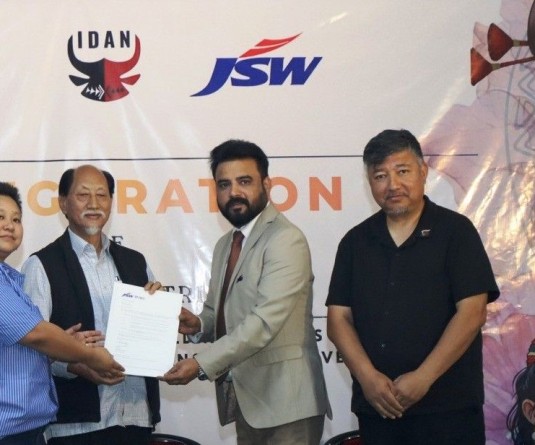
Morung Express News
Kohima | April 30
The theme speaker at the 29th General Conference of Naga Students Federation, Dr Aküm Longchari, Editor & Publisher, The Morung Express shared the need to foster and nurture relationships of trust, solidarity, interdependency, and harmony by practice of critical thinking and acting.
Describing the present Naga society as stuck in an intricate intersection and also at a turning point, Longchari said that the confluence was an opportunity for NSF to celebrate its legacy and critically reflect by drawing on its strengths and addressing its weaknesses, as a constructive process of moving forward.
Especially during the last few years, Longchari observed, “We (Nagas) have become deeply entrenched and divided over perceived and real positions, as well as on the approach meant for reaching the destination.”
He described the present Naga reality as one of ‘critical uncertainty’ caused by multiple factors, each interacting with the other and that most importantly, divisions defined by ‘past grievances.’
He pointed out that our inability to constructively address the burdens of history obstructs the way forward.
“Unfortunately, for some it is easier to reinforce uncertainties and widen differences rather than reconnect, rebuild relationships, and define a common shared vision that strengthens peaceful coexistence,” he mentioned.
‘Towards Harmony’
Like every generation, he said, Nagas of today are currently at a turning point of history. And therefore the theme, ‘Towards Harmony’ captures the essence of what we aspire to attain. Towards this he said, ‘Nagas need to explore ways ‘to cultivate Harmony from within and, to nurture Harmony from without.’
Stressing on the true essence of ‘Harmony’, Longchari said that in situations of inequality, conflict, injustice and oppression, the word ‘Harmony’ is often misunderstood to imply weakness, compromise, and passivity.
“The true essence of Harmony needs to be recovered and understood. I am persuaded that Harmony denotes action, relationships, and dynamism,” he affirmed and added, “To be in Harmony in a time of discontentment will foster radical act of truth, compassion, justice, acceptance, dignity and peace.”
‘Time for Self-Examination’
During a group exercise, Longchari took the participants on a ‘Self-Examination’ to explore the Dynamism of Harmony.
He let them to reflect on three purposes. First that each entity is a social and political fact and that truth is many sided whereby each is empowered to be an active participant in creating the truth.
He said the exercise further illuminates the diversity of thought, understanding and interpretations that exists within the gathering which is essential for Harmony. And the last one shows that an individual entity within the sum total when not aware of how interdependent we are of each other may be tempted to survive on its own or may try to assert dominance over the other.
“In the context of this exercise, harmony is essential to the principles of reciprocal dialogue, empathy and cooperation that uphold the reality of a shared humanity. This shared humanity celebrates diversity and supports an innovative dialogical model of living together where communication is open and fluid,” he asserted.
He also expounded that the Naga society is engaged in a struggle against fear and remains in the present state of paralysis while a crisis is cracking its foundation. As such, he viewed that the Naga people need to reclaim justice – as the effective harmony of the whole, and not as the right of the stronger, in order to heal and become whole.
Need art of critical thinking and acting
Longchari also noted that “Nagas need the art of critical thinking and acting to inform the social discourse which is free of any allegiance to any cultural grouping, party or faction. The practice of critical thinking and acting is to foster solidarity, to nurture the emergence of self-esteem, empathy, and respect for another, and to accept diversity by understanding each other more deeply.”
Harmony, therefore, is an opportunity for self-examination and exploration, analytical thinking, and conceptual insight, sharing, visionary imagination, and a call to common action, he said.
Longchari later said that the pandemic at the same time was offering the Nagas an opportunity to pause, learn from mistakes, to reimagine, and to think anew, to identify and explore basic steps and actions towards a new paradigm.
He said, “Towards Harmony is provocative, future oriented and offers radical hope as it links our present life to the realm of the future. It involves crafting a shared language towards building a dignified, respectful, and harmonious humanizing culture. Harmony is a process, a panacea, a journey, as well as a way of being.”
In conclusion, given the background and context of NSF, he called the organization to help, in an unbiased manner and free from patronizing politics, to empower the Nagas to cross key boundaries- to creatively engage with ideas of Harmony and the Naga future with people of various backgrounds who have diverging views; initiate with restorative imagination a cross-cultural dialogue with neighbouring peoples to mutually overcome fears, prejudices.





